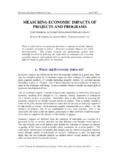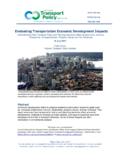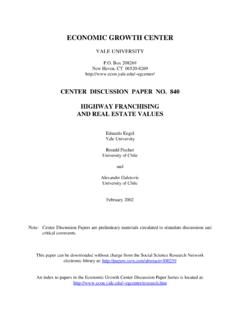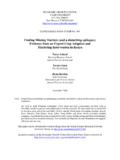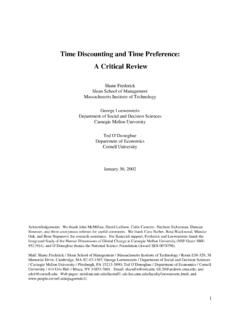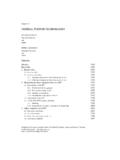Transcription of Admission to Econ PhD Programs
1 Admission to Econ PhD Programs : Comments, Advice, and Speculation from a Recent Applicant Tony Williams (Johns Hopkins University). Background I've noticed that advice for potential applicants to econ PhD Programs varies substantially based on who's giving the advice. Most notably, I am always shocked when I see comments such as this on message boards or the decision tables: Background: Ivy, little formal math Admits: --- (fill in with a few of your favorite top schools). Comments: Don't listen to people who say you need real analysis and other crazy math courses (or, Let me be the counter-example to the crazy-ass math nerds , etc).
2 For the record, I did not go to an Ivy; I am finishing up a second undergrad degree at an average state university. (I went back to get the math background needed for graduate econ.) There's nothing wrong with going to an Ivy, but I think the negative effect of little formal math for good students at top schools is often more than offset by the recommendations/connections of professors who are supporting these students'. applications. Therefore, I think such advice tends to be (unintentionally) misleading to many of us who look to places like (More on these ideas below.)
3 My advice to those of you who are at top institutions for undergrad . Quit reading these guides online and go talk to professors. Their advice is usually going to be much more valid and useful than what you read here. We're trying to understand what goes through your professors' minds as they sit down on an admissions committee and review our applications ( decide our fate); you can ask them directly. Go do so. And if you're feeling kind, please report back to the rest of us. My advice to the rest of who, like me, did not go to the greatest undergrad school.
4 First and foremost, if at all possible, I suggest you look at transferring to a better school. It doesn't have to be Harvard or MIT (not that either of these options will hurt you), but I. would recommend looking at a school that has Top 20 grad Programs in math and economics (there's an amazing amount of overlap, so this isn't hard to do). Your math background and recommendation writers are both very important, and transferring to a good school will make both of these factors more credible in the eyes of an admissions committee. Some will claim that I'm just speculating here, and they're right.
5 But I am absolutely convinced that I would have been accepted to better schools had I chosen to do my math work (second degree) at a better school. If you're convinced you have what it takes to succeed in a top econ program, it's pretty reasonable to think you can transfer to UT-Austin, UMD, UMich, UW-Madison, or a similar type school, and finish your undergrad studies there. What's important in the application (and in what order)? I. Your recommendations Doesn't it suck that they most important part of your application is they one part that is completely out of your hands?
6 Yeah, it does; but there are definitely things you can to increase the probability of having great letters. First, I definitely believe now that people on admissions committees look for reasons to trust (or not to trust) the recommendation letters, and this is where the letter writer becomes important. If the letter writer is known by members of the ad com, then the letter is more credible (in most cases). Remember, the ad com is trying to get an (imperfect) estimate on an unobservable characteristic (your ability to succeed in the program and, more importantly, to do quality research).
7 This is the primary reason that I suggest you transfer to a better school, since you are likely to find letter writers who will be trusted by the ad coms. Otherwise, my advice is very similar to what you'll read elsewhere. Get to know your professors well. Not only will they be your letter writers, but they're going to give you a great deal of useful advice on all aspects of your journey to become a winner of the John Bates Clark Medal, including helping you identify fields that really interest you, suggesting schools you should apply to, and maybe even making you a research assistant (and you should jump at the opportunity).
8 Like I said before, I really think that the recommendations and who writes them . are the most important aspect of your application, and it's the part that you have the least control over in many ways. (If for no other reason, the ad coms will trust the evaluation of someone who has completed a PhD program in economics before they will trust your own assumptions about your abilities and, let's be honest, they're right.). II. Your math background For the most part, nobody cares about the GPA you have in undergrad economics classes. Why? By now, you've hopefully realized that economic research and graduate economics Programs are incredibly math-intensive; you should have also noticed that your undergrad econ classes use little to no math.
9 Again, my advice here is similar to what you'll read elsewhere, but here goes. To be competitive for admissions, you need: multivariable calculus, linear algebra, and real analysis. Yes, you really do need to take real analysis. At your school, it may be called Intro to Analysis or Advanced Calculus. The standard text is Principles of Mathematical Analysis by Rudin, which is what you should be looking for if you're uncertain about which class you need to take ( if your school offers courses called Analysis' and Advanced Calculus', look to see which one uses Rudin; that's the one you want to take).
10 While you're at it, take probability, math stats (this should require multivariable calculus) if you're up for it, look to take measure theory, maybe topology, and some more advanced stats courses. As for economics courses, they're mostly useless predictors of your potential for success in grad school. The ad com is likely to put the most weight on intermediate micro (but not macro), econometrics, maybe game theory, and any grad courses you've taken. (I've heard these comments regarding undergrad econ courses from grad directors at Stanford, Yale, and Michigan so you're not just getting my speculation on this point.)
